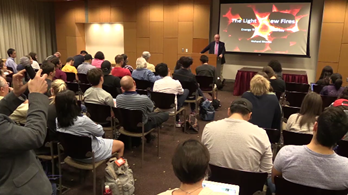CSPO News
After Paris: Energy, Carbon & Society in Global Transition
Energy and Society Symposium

In the wake of the historic COP21 climate summit in Paris last December, the world is faced with the challenge of radically transforming human energy systems. What will energy transitions look like, and how will they shape future societies? These questions underlay SFIS and CSPO’s Energy and Society Symposium, After Paris: Energy Carbon and Society in Global Transition. Two of today’s most important and provocative thinkers about energy and society were on hand to deliver talks exploring those issues.
The Anthropocene as Infrastructurally -induced Bad Mood
SFIS and the Environmental Humanities division of the English Department welcomed University of Oregon Barbara and Carlisle Moore Professor of English and Environmental Studies Stephanie LeMenager as a featured speaker during February’s SFIS-sponsored Energy and Society Symposium. LeMenager is the author of four books, including “Living Oil,” her most recent, which casts the modern energy system and aspirations for a renewable future as a comedic horror story about living death and resilience in the Anthropocene. Her lecture at ASU, titled Zombie Fuels, continued the themes from the book.
LeMenager spoke to a packed auditorium on February 23rd, fascinatingly “unpacking the potent charisma of energy.” The talk, like her writing, explored “the dark side of the Anthropocene” as she wondered if the “pleasures of petro-modernity” had actually led to “a profound social failure and environmental malaise.” What if it is our own species that has been diminished by efforts to dominate nature in the quest for greater and greater convenience? LeMenager also discussed media culture, photography, art and film, and the ways in which she has used social media to connect students at separate universities.
New fires light the way, but where will they lead us?
Richard Rhodes, author of the Making of Atomic Bomb, a book that won the Pulitzer Prize, a national Book Award and a National Book Critics Circle Award, lectured at ASU by invitation of SFIS as part of the Energy and Science Symposium held in February. The events are being co-sponsored by Lightworks, the Department of English, and SHPRS. Rhodes, author or editor of 25 books and former visiting scholar to the Massachusetts Institute of Technology, Harvard, and Stanford University, lectured on the topics of climate change and energy transitions in the coming century.
“The Light of New Fires” lecture did not paint as positive a picture as its title might have implied. Rhodes explained that the normal transition between prevailing energy technologies, the paradigm of 50 to 100 year shifts that has been modeled as far back as Elizabethan England, came to an abrupt end after the Fukushima disaster, as people and governments lost faith in nuclear power. “For more than four hundred years new energy sources have emerged and transitioned in a regular and seemingly predictable way. Today for the first time that predictability has failed.” The lack of another major energy source which could substitute for nuclear has resulted in an energy market that seems to have frozen, with each source roughly maintaining its current market share. Rhodes called the stall “deeply disturbing.” He concluded, “The energy future has escaped prediction, at least in shorter term, and may be headed for disaster. We are working on transition, but transitioning takes time. Do we have enough time?”